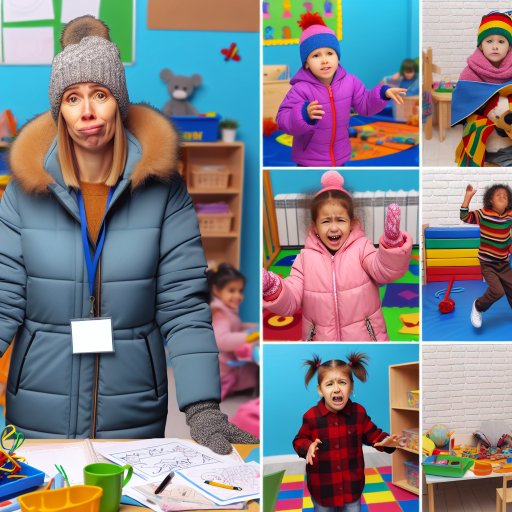Introduction to Youth Program Facilitators in Canada
Youth program facilitators play a vital role in Canadian communities.
They engage young people, providing guidance and support.
Facilitators help to create a safe environment for youth.
In addition, they foster personal growth and development.
These professionals empower youth to express themselves.
By doing so, they build confidence and self-esteem.
Furthermore, facilitators connect youth with resources.
This includes educational resources, mentors, and networking opportunities.
Collaboration is crucial among facilitators, organizations, and schools.
Their work addresses various social challenges faced by youth.
Moreover, they help to bridge gaps in support systems.
As a result, youth are better prepared for future challenges.
Role and Responsibilities of Youth Program Facilitators
Youth program facilitators organize engaging activities and events.
They tailor programs to meet the specific needs of participants.
Facilitators also promote inclusivity and diversity within groups.
This approach helps youth from different backgrounds to bond.
In addition, they assess youth interests and needs regularly.
Facilitators adapt their strategies accordingly.
The Impact of Youth Program Facilitators
The presence of facilitators significantly enhances youth experiences.
They encourage active participation in community events.
Facilitators also serve as positive role models.
This mentorship greatly influences young people’s decisions.
Furthermore, facilitators help in developing essential life skills.
Examples include teamwork, communication, and problem-solving skills.
These abilities contribute to youth’s future success.
Unlock Your Career Potential
Visualize a clear path to success with our tailored Career Consulting service. Personalized insights in just 1-3 days.
Get StartedChallenges Faced by Youth Program Facilitators
Youth program facilitators encounter various challenges in their roles.
For instance, funding constraints can limit program development.
Moreover, facilitators must navigate diverse youth needs.
Maintaining engagement among participants can also be difficult.
To overcome these challenges, collaboration is key.
Facilitators often partner with local organizations for support.
This collaboration enhances resources and program effectiveness.
Role of Youth Program Facilitators in Community Development
Building Trust and Relationships
Youth program facilitators cultivate trust within communities.
They act as bridges between youth and local organizations.
Furthermore, they foster open communication among diverse community members.
Empowering Young People
Facilitators empower youth through skill development.
They provide essential training in leadership and teamwork.
This empowerment encourages young individuals to take initiative.
Promoting Inclusivity
Facilitators ensure that programs are inclusive and accessible.
They create spaces where all youth feel welcome.
Additionally, they address barriers that marginalized groups face.
Facilitating Personal Growth
Facilitators support personal development in young participants.
They encourage self-reflection and critical thinking.
This guidance helps youth build resilience and confidence.
Encouraging Civic Engagement
Youth program facilitators promote active civic participation.
They engage young people in community service and advocacy.
Moreover, they instill a sense of responsibility and community ownership.
Enhancing Educational Outcomes
Facilitators collaborate with schools to enhance educational success.
They offer tutoring and mentorship programs for at-risk youth.
This collaboration significantly improves academic performance.
Creating a Supportive Network
Facilitators create networks that connect youth with resources.
They link young individuals to job opportunities and internships.
Such networks help youth navigate their career paths effectively.
Contributing to Community Economic Development
Facilitators play a role in local economic development initiatives.
They bring together local businesses and youth for job training.
Such partnerships stimulate economic growth in the community.
Skill Development and Mentorship Provided by Youth Program Facilitators
Building Essential Skills
Youth program facilitators play a vital role in skill development.
They help participants identify their strengths and weaknesses.
This process fosters personal growth and confidence.
Moreover, facilitators offer workshops on various topics.
These workshops include leadership, communication, and teamwork skills.
Each session is designed to be interactive and engaging.
Facilitators encourage creativity and critical thinking.
As a result, participants become more adaptable in different situations.
Providing Mentorship
Mentorship is another key aspect of youth program facilitators’ work.
Facilitators serve as positive role models for young individuals.
They share their experiences and insights with participants.
This sharing creates a supportive learning environment.
Facilitators also help youth set and achieve personal goals.
They guide participants through challenges and obstacles.
Mentorship builds trust and encourages open communication.
Consequently, youth feel empowered to pursue their passions.
Fostering Collaboration and Teamwork
Facilitators promote collaboration among participants.
This encourages teamwork and collective problem-solving.
They organize group activities that require partnership and cooperation.
Group dynamics help youth learn from each other.
Additionally, facilitators teach conflict-resolution strategies.
These strategies enhance group synergy and mutual respect.
As youth work together, they develop lifelong friendships.
Furthermore, teamwork prepares them for future work environments.
Connecting to Community Resources
Youth program facilitators connect participants with community resources.
This access opens doors for further learning and development.
Facilitators often invite guest speakers and experts.
These visitors provide real-world perspectives and opportunities.
Moreover, facilitators help youth volunteer in local organizations.
Volunteering fosters a sense of responsibility and civic engagement.
This experience enriches personal growth and community awareness.
Through these connections, youth gain valuable life skills.
Learn More: Career Coaching Tips for Canadian Professionals in Transition
Impact on Mental Health and Emotional Well-being of Youth
Importance of Mental Health Support
Youth programs play a vital role in supporting mental health.
They provide safe spaces for young people to express themselves.
This expression is crucial for emotional development.
Furthermore, these programs help identify mental health issues early.
Overall, they promote a proactive approach to mental well-being.
Building Resilience
Facilitators equip youth with essential coping strategies.
Resilience helps them face life’s challenges and uncertainties.
Through guidance, they learn to manage stress effectively.
Consequently, youth build confidence in their abilities.
This confidence significantly reduces feelings of anxiety.
Encouraging Social Connections
Youth programs foster community and belonging.
They provide opportunities to form supportive friendships.
Positive relationships contribute to emotional stability.
Additionally, these connections reduce feelings of isolation.
Ultimately, a strong support network promotes happier lives.
Promoting Positive Mental Health Practices
Facilitators teach critical mental health practices.
They emphasize the importance of self-care and mindfulness.
Moreover, they encourage help-seeking behaviors among youth.
This proactive approach helps normalize discussions about mental health.
As a result, youth become more aware of their needs.
Encouraging Emotional Expression
Facilitators create an environment for open dialogue.
Young people can discuss their feelings without judgment.
This freedom to express fosters emotional intelligence.
Consequently, youth learn to understand and manage their emotions.
Such skills are fundamental for future interpersonal relationships.
Assessing Overall Well-being
Programs often include assessments of mental health status.
These assessments help tailor interventions to specific needs.
Facilitators track progress and adapt strategies accordingly.
Such evaluations ensure that youth receive the necessary support.
Ultimately, they promote a culture of continuous improvement.
Find Out More: Benefits of Working as a Youth Program Facilitator
Encouragement of Civic Engagement and Social Responsibility among Youth
Youth program facilitators play a vital role in promoting civic engagement.
They actively involve young people in community activities.
This participation fosters a sense of belonging among youth.
Furthermore, it encourages them to take responsibility for their communities.
Building Awareness of Civic Duties
Facilitators educate youth about their civic responsibilities.
They provide information on social rights and duties.
These opportunities help develop informed future citizens.
Young people learn the importance of voting and advocacy.
Fostering Community Participation
Facilitators organize community service projects.
These projects encourage teamwork and collaboration among youth.
Youth often engage in local events and initiatives.
Such involvement enhances their connection to the community.
Encouraging Leadership Skills
Facilitators empower youth to develop leadership abilities.
They offer training programs and workshops for skill development.
Youth are encouraged to take on leadership roles in projects.
This experience prepares them for future responsibilities.
Promoting Social Justice and Equity
Facilitators emphasize the significance of social justice.
They inspire youth to advocate for equity in their communities.
Through discussions and initiatives, youth become more aware.
This awareness often leads to activism and change-making efforts.
Creating Safe Spaces for Dialogue
Facilitators cultivate open and safe environments for dialogue.
Youth are encouraged to express their opinions and thoughts.
This practice builds confidence and communication skills.
Moreover, it helps in addressing community issues collectively.
See Related Content: Building Meaningful Connections as an Early Childhood Educator

Cultural Sensitivity and Inclusion in Youth Programs
Importance of Cultural Sensitivity
Cultural sensitivity promotes understanding among diverse youth groups.
It helps facilitators create a welcoming atmosphere.
Facilitators who practice cultural sensitivity build trust and rapport.
This trust encourages participation from all community members.
Incorporating Diverse Perspectives
Your program should embrace diverse cultural backgrounds.
Each participant brings unique experiences and viewpoints.
Facilitators must actively listen to these perspectives.
This inclusivity enriches group discussions and activities.
Training and Development
Ongoing training is essential for youth program facilitators.
Workshops on cultural competence enhance their skills.
Facilitators must learn about various cultures and customs.
This knowledge equips them to handle sensitive topics.
Setting Inclusive Policies
Programs should establish clear inclusion policies.
These policies should promote respect and collaboration.
Facilitators must enforce these policies consistently.
This approach creates an environment where everyone feels valued.
Engaging with the Community
Facilitators should engage local communities in their programs.
They can collaborate with cultural organizations and leaders.
This engagement fosters a sense of belonging among participants.
Moreover, it encourages youth to share their cultural heritage.
Regular Feedback and Improvement
Soliciting feedback is vital for ongoing improvement.
Facilitators should create anonymous surveys for participants.
This feedback can guide adjustments in program delivery.
Ultimately, it enhances cultural sensitivity across all activities.
Delve into the Subject: How to Become a Certified Early Childhood Educator in Canada
Collaboration with Schools and Other Organizations to Enhance Opportunities
Creating Strong Partnerships
Youth program facilitators effectively collaborate with schools and local organizations.
These partnerships create an enriching environment for young people.
Schools benefit from additional resources and expertise.
Moreover, organizations gain direct access to youth in their communities.
This mutual collaboration strengthens program outreach and effectiveness.
Expanding Educational Opportunities
Facilitators work closely with educators to design relevant programs.
They focus on enhancing the curriculum with practical experiences.
Workshops and extracurricular activities engage students in meaningful ways.
Consequently, they help bridge the gap between theory and practice.
Students gain valuable skills that prepare them for future careers.
Building Community Engagement
Collaboration fosters a sense of community among local organizations.
Facilitators coordinate events that bring youth and adults together.
These events create spaces for mentorship and networking.
Furthermore, they promote volunteerism and civic engagement.
In turn, youth develop leadership skills and community awareness.
Involving Parents and Guardians
Youth program facilitators actively involve parents in the process.
They encourage family participation in various activities.
This approach reinforces learning and community support.
Parents become more invested in their children’s development.
Consequently, they help sustain positive outcomes for the programs.
Measuring Success Together
Collaboration allows for effective assessment and feedback.
Stakeholders can evaluate the impact of youth programs together.
Regular meetings and updates ensure everyone remains aligned.
Furthermore, data collection helps identify areas for improvement.
This collective effort drives continuous enhancement of the programs.
Challenges Faced by Youth Program Facilitators and How to Address Them
Understanding the Role of Youth Program Facilitators
Youth program facilitators play a crucial role in shaping young lives.
They provide guidance, support, and skills development to youth in Canada.
However, they often face significant challenges in their work.
Common Challenges Faced
One major challenge is a lack of resources.
Many facilitators struggle with insufficient funding for programs.
Additionally, inadequate training can hinder their effectiveness.
Furthermore, they may encounter varying levels of engagement from youth.
Some participants may lack motivation or face external pressures.
Addressing Resource Constraints
To combat resource limitations, facilitators can seek partnerships.
Collaboration with local businesses can provide financial support.
Moreover, applying for grants and funding opportunities is beneficial.
Organizing community fundraisers enhances both visibility and resources.
Enhancing Training and Development
Facilitators should pursue ongoing professional development.
Workshops and training programs can enhance their skills significantly.
Networking with other professionals provides valuable insights.
Additionally, mentorship opportunities can foster growth and confidence.
Boosting Youth Engagement
Engaging youth requires innovative strategies and adaptability.
Offering diverse program options caters to different interests.
Incorporating technology can capture their attention more effectively.
Building trust with youth encourages open communication and participation.
Creating a Supportive Environment
A supportive environment is vital for youth development.
Facilitators should encourage peer interaction and teamwork.
Recognizing individual achievements boosts confidence and motivation.
Moreover, fostering an inclusive atmosphere welcomes diversity.
Measuring Success and Impact
Evaluating program effectiveness is essential for improvement.
Facilitators can gather feedback from participants and stakeholders.
Using surveys and assessments provides measurable outcomes.
Regularly reviewing programs helps identify areas for enhancement.
Additional Resources
Shobhana Bhushan (M.A, M.Ed) – Learning and Facilitation Lead …
Facilitators and Barriers to the Implementation of iSPRINT: A Sport …




